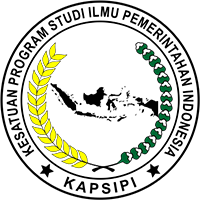Politik Identitas dan Negara Bangsa di Riau
DOI:
https://doi.org/10.35967/jipn.v17i29.7054Keywords:
politics of identity, nations, disingeration, LAM of RiauAbstract
Riau Vision 2020, regional regulations on Lembaga Adat Melayu[LAM] Riau, the issue of sons and non-sons of the region in regional head elections are the main characteristic of the ongoing revival of the Political Identity of the era of regional autonomy in Riau. The Rise of Identity Politics in Riau is considered to be at odds with the nation-state whose essence is recognizing diversity. The politics of identity in this context is considered to jeopardize the development of the diversity-based nation-state [nationalism]. This research aims, firstly, to address the Political Identity relationship with the nation-state in Riau in an effort to prevent local disintegration. Second, explaining the main obstacles to the Political Identity relationship with the nation-state in Riau in an effort to prevent local disintegration. The Political Approach to Identity and Nation- State is used as a theoretical framework. This study uses a qualitative approach with descriptive analysis method. Data is collected based on documents supported by interviews. After collecting the data analyzed qualitatively. The results of the study concluded, first, that the existence of the Riau 2020 vision, and the Riau Malay Customary Institution as a forum for empowerment of ‘Malays’ in the context of the Politics of Identity and State-nation, kept the potential for ethnicideological conflict. The concept of ‘Melayu’ in the vision impresses the sultry between Malay [ethnic] and Islam [ideology]. The vision is the consequence of local-minority hegemony. ‘Melayu’, structurally and constitutionally suggests that Melayu Malays ’control, even though there are minorities if they are accumulated with other ethnic groups. Second, the various obstacles that occur in the relationship between the Politics of Identity and State-nation are, [1] Malays are interpreted as hegemony in terms of relative deprivation. [2] Structural and cultural constraints have an effect on the relationship between the nation-state and the Politics of Identity [the existence of Riau LAM suggests more superiority and cultural domination. [3] Shifting issues in Political Idenitas, does not work linearly due to institutional-based personal interests. Practically this research provides an important reference for the relationship between LAM Riau and local governments that can prevent local disintegration. Academically, the relationship between the nation-state and the Politics of Identity can be constructed into a model and approach that can anticipate potential identity conflicts, especially in Riau.
Downloads
References
Abdul Rahman Embong. 2012. Negara-bangsa proses dan perbahasan. Edisi ke-2. Bangi: Universiti Kebangsaan Malaysia.
A.C. Manulang. 2006. Terorisme & Perang Intelijen. Jakarta: Manna Zaitun.
Armstrong, Karen. 2002. Berperang demi tuhan: fundamentalisme dalam Islam, Kristen dan Yahudi. Terj. Satrio Wahono. Bandung: Mizan.
Ahmad Syafii Maarif. 20012. Politik Identitas dan Masa Depan Pluralisme Kita. [pnyt] Ihsan Ali Fauzi dan Samsu Rizal Panggabean. Edisi Digital. Jakarta: Yayasan Abad Demokrasi.
Faucher, C. 2006. Popular discourse on identity politics and decentralisation in Tanjung Pinang publicschools. Asia Pacific Viewpoint 47(2): 273-285.
Guss, D. M. 2000. The festive state: race, ethnicity and nationalism as cultural performance. Berkeley:University of California Press.
Henk Schulte Nordholt dan Gerry Van Klinken. 2007. Politik Lokal di Indonesia. Jakarta: YOI.
Kahn, J. S. 2006. Other Malays: nationalism and cosmopolitanism in the modern Malay world. Singapore: Asian Studies Association of Australia in association with Singapore University Press and NIAS Press.
Lijphard, Arend. 1977. Democracy in Plural Societies: A Comprative Explanation. New Haven: Yale University Press.
Muhtar Haboddin. 2012. Menguatnya politik identitas di ranah lokal. Jurnal Studi PemerintahanVolume 3 Nomor 1 Februari.
Malley, M. 1999. Regions: centralisation and resistance in Emmerson, D. K. (pnyt). Indonesia beyond Suharto: polity, economy, society, transition. Armonk: M.E. Sharpe.
Moeloeng, Lexy J. 2000. Metodologi Penelitian Kualitatif. Bandung: Remaja Rosdakarya.
Muchid Albintani. 2001. Dari Riau merdeka sampai otonomi nol. Pekanbaru: Unri Press.
Peraturan Daerah Provinsi Riau No.1 Tahun 2004 tentang Rencana Strategis (Renstra) Provinsi Riau Tahun 2004-2008.
Peraturan Daerah Provinsi Riau No.1 Tahun 2012 tentang Lembaga Adat Melayu Riau.
Syamsuddin Haris [pnyt]. 1999. Indonesia di ambang perpecahan. Jakarta: Erlangga.
Siti Zuhro. 1999. Riau dan otonomi daerah. Dalam Syamsuddin Haris [pnyt]. Indonesia diambang perpecahan. Jakarta: Erlangga.
Sen, Amartya. 2007. Kekerasan dan ilusi tentang identitas. Serpong: Marjin Kiri.
Sri Astuti Buchari. 2014. Kebangkitan etnis menuju politik identitas. Jakarta: Yayasan Pustaka Obor Indonesia.
Tabrani Rab. 1990. Fenomena Melayu. Pekanbaru: Lembaga Studi Sosial Budaya Riau.
Thomas Santoso. 2000. Potret kekerasan politik agama dalam era reformasi.Makalah dipresentasikan dalam Lokakarya Flienders Fisip UGM, Yogyakarta.
Ubed Abdilah.2002. Politik identitas etnis. Magelang: IndonesiaTera.
William. 2006. Bagaimana mengelola konflik: petunjuk praktis untuk manajemen konflik yang efektif. Cetakan keenam. Terj. Arif Santoso. Jakarta: PT. Bumi Aksara.
Downloads
Published
How to Cite
Issue
Section
License
Copyright (c) 2018 Author(s)

This work is licensed under a Creative Commons Attribution-NonCommercial-ShareAlike 4.0 International License.





